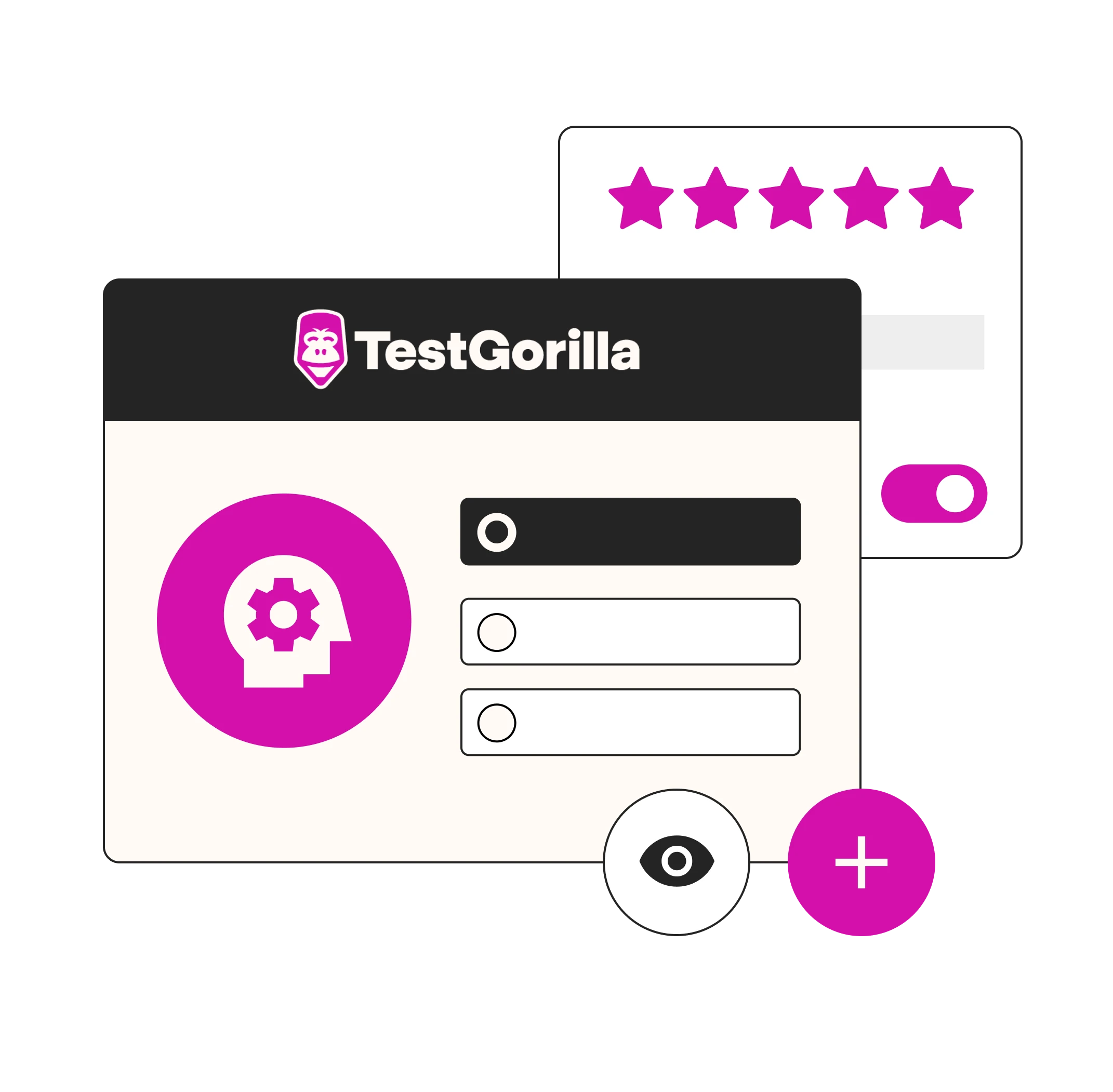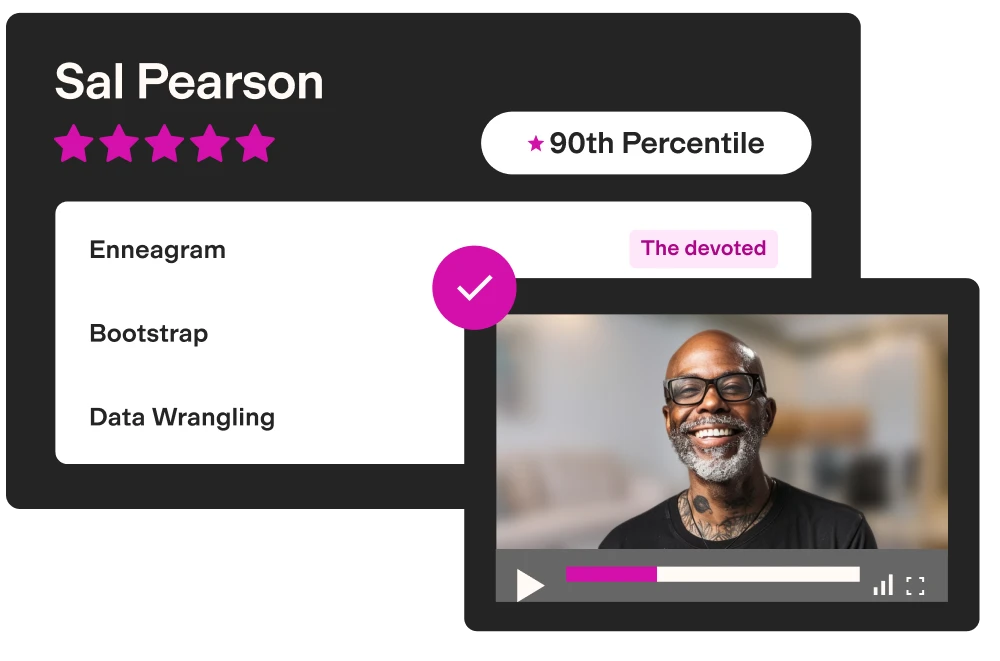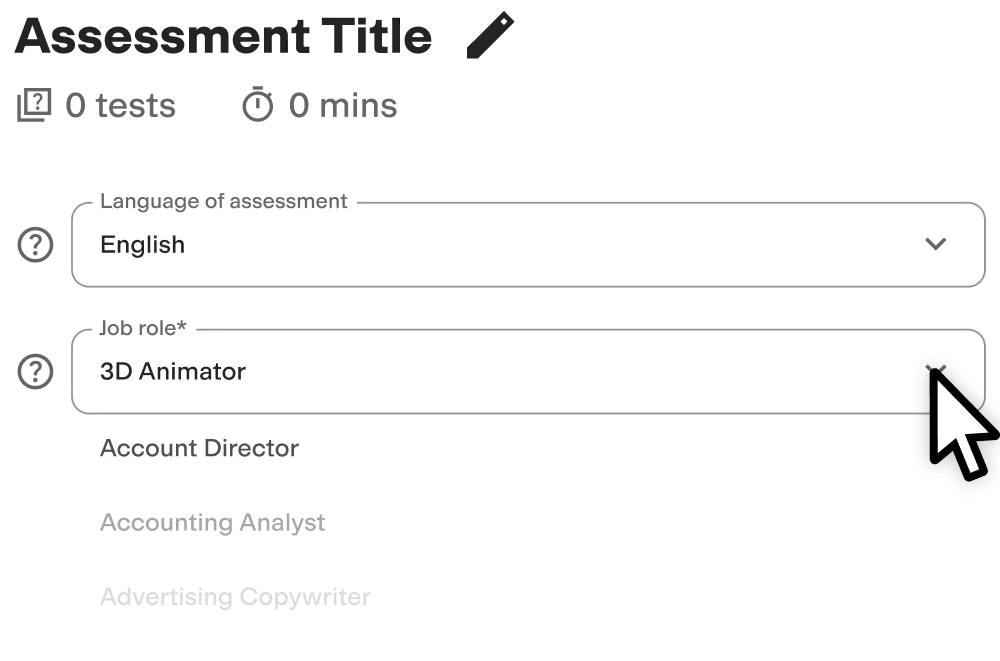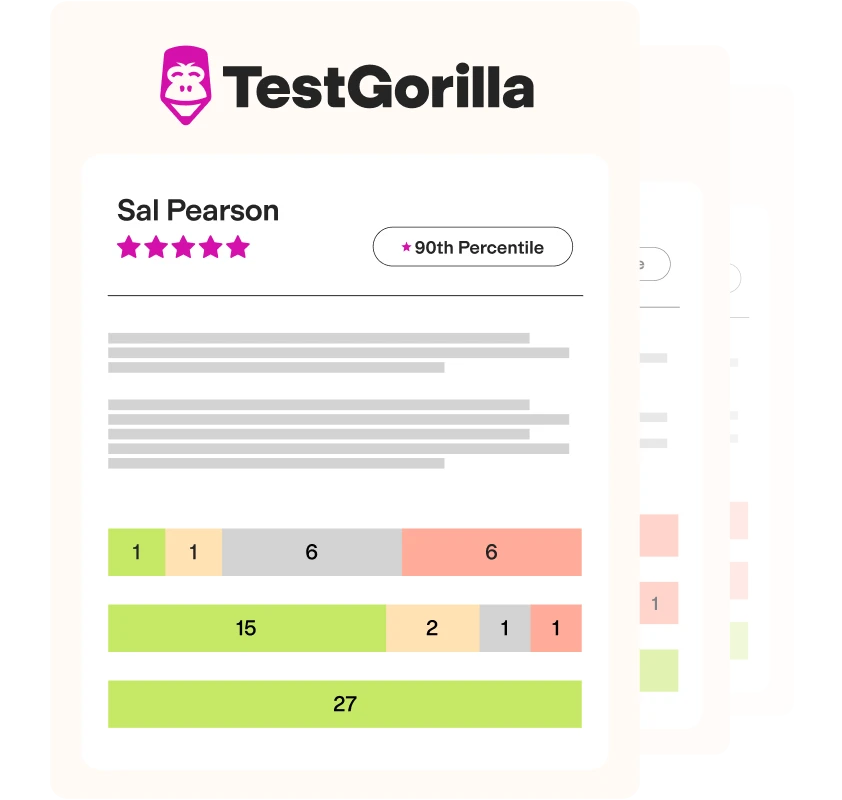Critical Thinking test: Pre-employment screening assessment for hiring the best
Summary of the Critical Thinking test
This online Critical Thinking skills assessment evaluates candidates’ skills in critical thinking through inductive and deductive reasoning problems. This pre-employment aptitude test helps you identify candidates who can evaluate information and make sound judgments using logic and analytical skills.
Covered skills
Analyzing syllogisms
Making inferences
Recognizing assumptions and fallacies
Weighing arguments
Use the Critical Thinking test to hire
Any role that involves a high degree of critical and independent thinking to solve complex problems, such as analysts, engineers, executives, lawyers, marketers, and data scientists, among many others.
About the Critical Thinking test
Effective critical thinking requires skillfully conceptualizing, applying, analyzing, and evaluating information to make a sound, logical judgment or formulate an innovative solution.
In practice, this means that candidates can identify what information is important to solving a problem, gather it where possible, and draw conclusions to reach a solution. It requires using a range of soft skills and cognitive abilities, including:
Creativity
Logical reasoning
Open-mindedness
Evaluation
Strategizing
Reflection
These skills are difficult, or even impossible, to glean from a resume; employers should use critical thinking skills tests instead to assess them quickly and easily without bias.
Our Critical Thinking test evaluates candidates’ abilities to:
Solve syllogisms through deductive reasoning skills and logical thinking
Interpret sequences and arrangements, evaluate arguments to find a weak argument, and draw sound conclusions
Ask deduction questions and assess cause-and-effect relationships
Practice reading comprehension to recognize assumptions
These types of questions (see our practice test for sample questions) measure critical thinking by presenting candidates with single or multiple-choice statements, asking them to analyze the information and use logic to identify the correct answer.
By using a critical thinking assessment test to screen candidates with a time limit, you can ensure that everyone you invite to interviews meets a baseline requirement for critical thinking skills. Besides, you reach this conclusion through a data-driven, unbiased method that takes a fraction of the time of traditional resume screening.
The test is made by a subject-matter expert
TestGorilla Assessment Team
TestGorilla's Assessment Team is responsible for the delivery of leading edge, science-based measurement, assessment content, insights and innovation. The team is comprised of organizational psychologists, data scientists, psychometricians, academics, researchers, writers, and editors.
Collectively, the Assessment Team boasts more than 15 advanced degrees, more than 100 scientific publications and presentations, and almost 100 years of assessment and talent acquisition industry experience.
Crafted with expert knowledge
TestGorilla’s tests are created by subject matter experts. We assess potential subject-matter experts based on their knowledge, ability, and reputation. Before being published, each test is peer-reviewed by another expert, then calibrated using hundreds of test takers with relevant experience in the subject.
Our feedback mechanisms and unique algorithms allow our subject-matter experts to constantly improve their tests.
What our customers are saying
TestGorilla helps me to assess engineers rapidly. Creating assessments for different positions is easy due to pre-existing templates. You can create an assessment in less than 2 minutes. The interface is intuitive and it’s easy to visualize results per assessment.

VP of engineering, mid-market (51-1000 FTE)
Any tool can have functions—bells and whistles. Not every tool comes armed with staff passionate about making the user experience positive.
The TestGorilla team only offers useful insights to user challenges, they engage in conversation.
For instance, I recently asked a question about a Python test I intended to implement. Instead of receiving “oh, that test would work perfectly for your solution,” or, “at this time we’re thinking about implementing a solution that may or may not…” I received a direct and straightforward answer with additional thoughts to help shape the solution.
I hope that TestGorilla realizes the value proposition in their work is not only the platform but the type of support that’s provided.
For a bit of context—I am a diversity recruiter trying to create a platform that removes bias from the hiring process and encourages the discovery of new and unseen talent.

Chief Talent Connector, small business (50 or fewer FTE)
Use TestGorilla to hire the best faster, easier and bias-free
Our screening tests identify the best candidates and make your hiring decisions faster, easier, and bias-free.
Watch what TestGorilla can do for you
Create high-quality assessments, fast
Building assessments is a breeze with TestGorilla. Get started with these simple steps.
View a sample report
The Critical Thinking test will be included in a PDF report along with the other tests from your assessment. You can easily download and share this report with colleagues and candidates.
Why are critical thinking skills important to employers?
The importance of critical thinking abilities in the workplace comes from its ability to improve performance in almost any role. If a candidate can think critically about problems, they are likely to solve them faster and with less need for intervention from superiors.
Critical thinking practice is essential for managers, who regularly need to make decisions that affect multiple people and involve many variables. Other benefits of fostering critical thinking in the workplace include:
Encouraging creative problem-solving and organizational agility
Improving conflict resolution
Promoting ethical decision-making
Creating a culture of continuous learning
Asking all applicants to answer critical reasoning test questions can help you hire competent employees and effective managers on a global scale in a fraction of the time. Nexus HR, an HR services provider, did precisely this with our tests – reducing their “time-to-fill” metrics for open positions and improving the quality of hire, particularly in India and the Philippines.
Critical-thinking competencies to hire for
Candidates with critical-thinking skills have several competencies:
Observation skills: They constantly seek new information by asking others or observing their environment and the people around them.
Analysis: They can use fast thinking to analyze new situations, but they can also slow down and analyze situations by asking questions and conducting research.
Decision-making: After observing and analyzing the data available, candidates can critically evaluate the information at their disposal to make a data-driven decision.
Communication: A great critical thinker also knows the importance of communicating their decisions to those around them and understands how best to organize this information for others.
Problem-solving: The candidate can apply their skills in observing and analyzing data to decision-making and finding solutions to complex problems.
What job roles can you hire with our Critical Thinking test?
This Critical Thinking assessment test is not role-specific, which means you can use the Critical Thinking test for employment across any number of roles.
Here are a few examples:
Analysts must know how to interpret data, identify patterns, and provide actionable, feasible insights
Engineers use their critical thinking skills to tackle complex problems and devise effective solutions that meet or exceed safety standards
Chief executive officers must be able to shape organizational strategy, adapt to change, and inspire their workers to perform at their best
Lawyers analyze case law, construct arguments, and navigate legal complexities with sharp critical thinking
Marketers craft compelling brand messages and develop successful go-to-market strategies thanks to a mixture of research and strategic thinking
Data scientists rely on critical thinking skills to examine data sets, spot trends, and make informed business decisions
Teachers design tutorials, create practice questions, evaluate student performance, and adapt their teaching methods based on careful analysis and reflective judgment
Healthcare professionals use critical thinking skills to assess patient symptoms and devise appropriate care plans
Create a multi-measure assessment: 4 tests to pair with the Critical Thinking test
With TestGorilla, you can combine up to five psychometric tests into a multi-measure assessment to find well-rounded candidates.
Here are the tests you should consider including alongside our critical thinking evaluation in your recruitment process.
Communication test: Assess candidates’ ability to communicate clearly and professionally through written, verbal, or non-verbal communication.
Time Management test: Present candidates with typical workplace scenarios to assess how effectively they can prioritize, plan, and execute tasks.
Problem Solving test: Hire candidates with the ability to analyze and interpret textual information to make correct decisions.
Big Five (OCEAN) test: Evaluate candidates on five key factors of personality: openness, conscientiousness, extraversion, agreeableness, and emotional stability.
Note: We haven’t included any role-specific skills tests here because they depend on the position you’re hiring for. However, we highly recommend you add at least one in your five-test assessment to ensure your candidates possess the right skills for the job.










